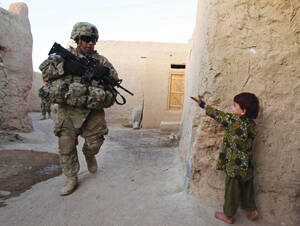As Operation Enduring Freedom marked its 11th anniversary on Oct. 7, the conflict in Afghanistan remains a largely undiscussed issue in the 2012 presidential campaign. Both major candidates—President Barack Obama, the Democrat, and his Republican challenger, Gov. Mitt Romney—have kept Afghanistan on the rhetorical back burner as they crisscross the country, even though 68,000 U.S. troops remain on the ground.
Defense Secretary Leon Panetta announced on Sept. 21 that the last of the 33,000 troops that were part of the 2010 surge have left Afghanistan. While the Obama administration has said the surge weakened the Taliban, the insurgency remains a potent force and threatens the security of both troops and Afghan civilians.
On Oct. 5 combined Afghanistan coalition military fatalities stood at 3,197 dead, including 2,132 Americans, according to statistics compiled by the Web site iCasualties.org. Thousands more have been wounded in a war marked largely by low-intensity conflicts in a country slightly smaller than Texas. Estimates of civilian casualties in Afghanistan vary widely, but the latest U.N. figure puts the death toll among noncombatants at more than 25,000—the majority victims of the insurgency.
Afghanistan gets scant attention even on the candidates’ Web sites. On the president’s re-election site, Afghanistan garners a two-line reference in a promise to withdraw U.S. troops by the end of 2014. Romney’s Web site offers a longer narrative on the war. But his criticism of the president’s surge and the 2014 deadline to withdraw forces is longer than his plan for addressing Afghan security. “Withdrawal of U.S. forces from Afghanistan under a Romney administration will be based on conditions on the ground as assessed by our military commanders,” the site concludes.
“The truth is that both candidates have avoided talking about Afghanistan because neither has really good answers,” said Michael J. Boyle, assistant professor of political science at La Salle University in Philadelphia. Boyle said that even though the president plans to withdraw the remaining U.S. troops by the end of 2014, “events on the ground are not cooperating with him.
“We have the situation that the Taliban aren’t losing, and that is not making the U.S. withdrawal very easy.”
Of Romney’s stance, Boyle said there is little to dissect.
“He says, ‘We will win,’ but there’s no clear understanding of what winning means at this point,” he said. “Does winning mean increased security and stability? Does winning mean defeating the Taliban?”
Beyond its military goals, the United States has a “moral obligation” to rebuild both Afghanistan and Iraq, said Stephen Colecchi, director of the U.S. bishops’ Office of International Justice and Peace.
“Our foreign assistance needs to continue to the Iraqi people both to enable them to rebuild society and to strengthen the rule of law and to strengthen the judiciary and to protect all Iraqis, but especially vulnerable minorities and particularly Christians. That’s the unfinished agenda of the legacy of that war that we still have to deal with,” he said. Much the same holds true in Afghanistan, even as hostilities continue, he added.
U.S. bishops have encouraged the U.S. government to focus more on diplomacy, development and humanitarian assistance and less on exclusively military responses to geopolitical challenges. Other concerns that must be addressed, the bishops have pointed out, include protecting human rights and religious freedom, minimizing the loss of human life and assisting refugees and internally displaced people while fostering economic and agricultural development.
None of those issues is specifically addressed on the candidates’ Web sites.








